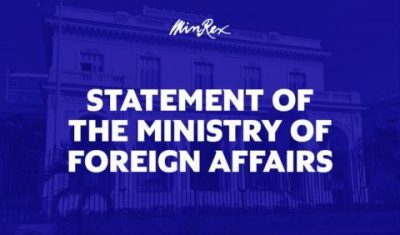Cuba Rejects Presence of U.S. Nuclear Submarine in Guantanamo Bay. Statement by the Ministry of Foreign Affairs

All Global Research articles can be read in 51 languages by activating the Translate Website button below the author’s name.
To receive Global Research’s Daily Newsletter (selected articles), click here.
Click the share button above to email/forward this article to your friends and colleagues. Follow us on Instagram and Twitter and subscribe to our Telegram Channel. Feel free to repost and share widely Global Research articles.
***
The Ministry of Foreign Affairs categorically rejects the entry into Guantanamo Bay, on July 5, 2023, of a nuclear-powered submarine that remained until July 8 at the U.S. military base located there, which constitutes a provocative escalation by the United States, whose political or strategic motives are unknown.
As is known, the U.S. military base has occupied that territory of 117 square kilometers for 121 years, against the will of the Cuban people and as a colonial remnant of the illegitimate military occupation of our country that began in 1898, after the expansionist intervention in the war of independence of the Cubans against the Spanish colonial power.
It is an enclave that for many years has lacked strategic or military importance for the United States. Its permanence only responds to the political objective of trying to outrage the sovereign rights of Cuba. Its practical use in recent decades has been reduced to serving as a center for detention, torture and systematic violation of the human rights of dozens of citizens from various countries.
The presence of a nuclear submarine there at this time forces us to question what is the military reason for its presence in this peaceful region of the world, against what objective it is directed and what strategic purpose it is pursuing.
It should be remembered that the 33 nations of the region are signatories of the Declaration of Latin America and the Caribbean as a Zone of Peace, signed in Havana in January 2014.
It is also important to take into account that, as a threat to the sovereignty and interests of the Latin American and Caribbean peoples, the United States has established more than 70 military bases in the region, with varying degrees of permanence, plus other operational forms of military presence. Its senior military commanders have made public reference in recent times to the intention of using its military might to secure U.S. ambitions over the natural resources of Latin America and the Caribbean.
The Ministry, in reiterating its rejection of the U.S. military presence in Cuba and its demand for the return of the illegally occupied territory in the province of Guantanamo, warns of the danger posed by the presence and movement of nuclear submarines of the U.S. armed forces in the nearby Caribbean region.
*
Note to readers: Please click the share button above. Follow us on Instagram and Twitter and subscribe to our Telegram Channel. Feel free to repost and share widely Global Research articles.

